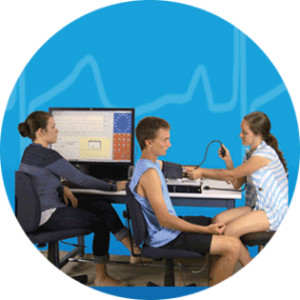Fundamentals of Physiological Data Recording
Date
Tuesday, February 27, 2018
Location
On-Demand Playback

Understanding the basic principles of physiological data collection is critical to both educators and researchers who teach and conduct physiology experiments. Configuring your equipment and knowing the fundamentals of data collection will help you avoid making costly missteps and even refine your current experiment. Frazer Findlay, CEO of BIOPAC, recognizes common mistakes with physiology recording and shares his secrets for collecting great data. Utilizing over 20 years of experience in the life sciences monitoring industry, Frazer outlines important guidelines by conducting a live demo with real-world examples and live data collection. Watch now to learn:
Fundamentals of Physiology Presentation Slides Related Webinars:
| Complete Form to Watch Webinar! |
For more information about BIOPAC events, check the BIOPAC Events Calendar or email support@biopac.com.
Stay Connected